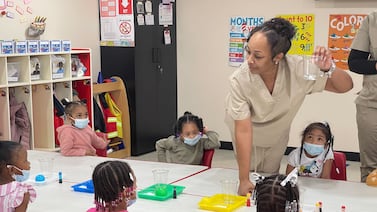The number of metro Detroiters enrolling in college or post-high school training programs was already declining pre-COVID, but now it’s falling even lower. The number of residents earning degrees is also declining, raising concerns that employers will continue to struggle to find qualified workers.
The Detroit Regional Chamber raised those concerns in a State of Education report released Wednesday. The report uses regional, state, and national data to paint a grim outlook for metro Detroit and students who are Black or Latino or come from low-income homes. The report also says that efforts to get more residents, particularly adults, to earn degrees or certificates have stalled
Currently, just half of the 11-county region’s residents have a postsecondary credential, which includes two-year and four-year college degrees or a certificate in fields such as nursing or welding. The goal is to get that number up to 60%, but that won’t happen if enrollment continues to decline or those in college don’t finish.
“COVID has taken a toll and has made a bad situation even worse,” said Sandy Baruah, president and CEO of the chamber.
If the percentage doesn’t improve, the implications aren’t just dire for employers trying to fill jobs, Baruah told reporters this week.
“One of the reasons this issue is so important is (that) the level of educational attainment has a direct impact on an individual and a family’s economic security,” Baruah said. An individual’s financial stability is also directly related to the financial stability of a community. And “employers will go where the talent is,” he said.
Here are some of the concerning statistics the report highlights:
- Even before the pandemic, there were concerns about regional postsecondary enrollment, particularly for students graduating from Detroit schools. The report shows that from 2018 to 2019, the percentage of high school graduates who didn’t enroll in college or a certificate program grew from 28% to 34% for the region. The number rose from 38% to 53% in Detroit.
- Undergraduate enrollment in Michigan dropped by 8.9% between 2019 and 2021. That compares to a drop of 8% for the nation. The report says that fewer students enrolling in postsecondary education will mean employers won’t have enough qualified workers to fill jobs that pay middle class or higher wages.
- The undergraduate enrollment data is even worse for students who graduate from schools with a large number of students from low-income homes. Their enrollment rate fell by 10% nationally between 2019 and 2020. Regional data was not available.
- Nationally, 74% of students who started college in the fall of 2019 returned in the fall of 2020. For Black students, it was 65%, and for Latino students, it was 69%.
There were a few bright spots in the data. The percentage of students who graduated from high school in 2014 and are on track to graduate from a postsecondary institution within six years is on the rise. Postsecondary graduation rates are also on the rise.
The chamber is involved in or leading a number of initiatives to boost postsecondary numbers, including the Detroit Promise, which provides scholarships for students in the city to attend a community college or four-year institution. The chamber is also a member of Launch Michigan, a nonpartisan advocacy group that has pushed for changes to the state’s education system that will ensure more students graduate prepared for postsecondary success.
The Chamber’s Detroit Reconnect initiative is aimed at helping adults enroll in a higher education. In 2019, there were more than 676,000 adults in the region with some college credits, but they had not earned a degree or credential.
Become a Chalkbeat sponsor
“If we can get a big chunk of them, that could make a big difference, you know, right away,” Baruah said.
Lori Higgins is the bureau chief for Chalkbeat Detroit. Contact her at lhiggins@chalkbeat.org.







